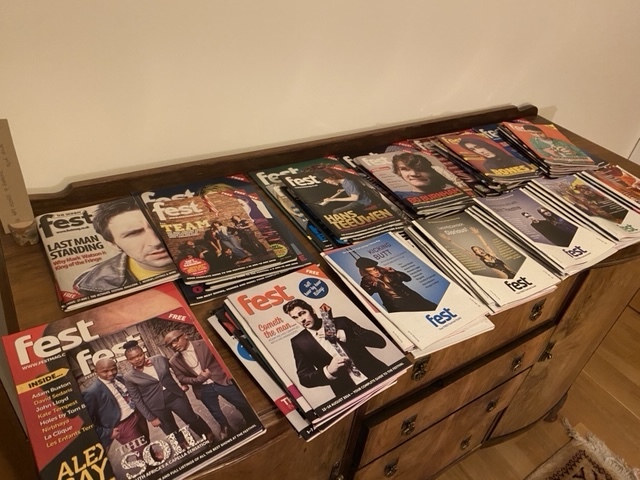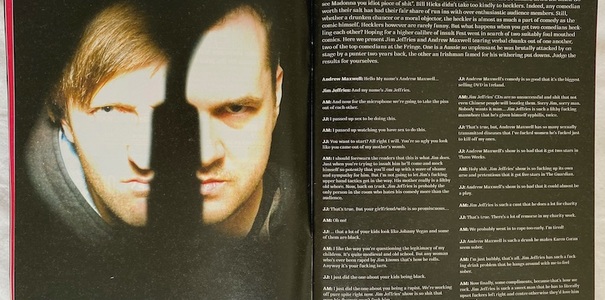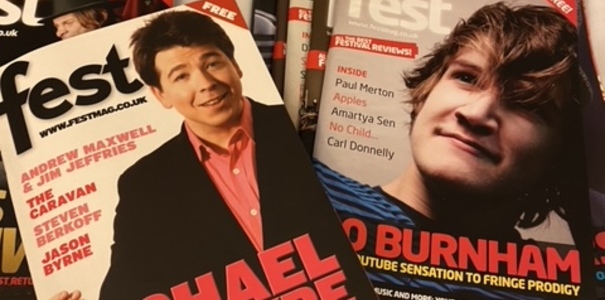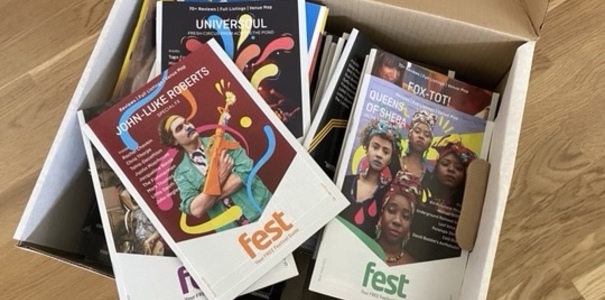Fest Magazine celebrates 20 Years
Outgoing editor Evan Beswick looks back on 20 years of Fest, and then moves on

It’s hard to pinpoint just where it sticks: in the mind or in the craw. Memorable, and terrible. It was 2008 and, against all advice, we went to print with a feature that attempted a pastiche of the film poster for Face/Off, only subbing Nicholas Cage and John Travolta for Jim Jeffries and Andrew Maxwell. The execution was abysmal; the premise, arguably, worse. Two mainstream, acerbic, white comics, in conversation with each other, slapped on a print run of 10,000. But in 2008, that’s where the festivals were, and that’s were Fest was, too. It was the high point of the (male) Aussie ascendency at the Fringe. I remember seeing Jeffries that year and thinking contemporary performance couldn’t plausibly get any better. Reader. It did.
This was the feature that I dreaded unearthing as I sat down one afternoon and hauled out an archive box holding every issue of Fest since 2007. The Fringe marks its 75th year in 2022, and Fest has been with it now for 20 of those. I’ve been around since 2007 when the upstart tabloid switched to the glossy brochure audiences have been able to pick up ever since in venues across Edinburgh (and, in recent years, Adelaide – though that’s a different story).

Heckle/Off image courtesy of Evan Beswick
I’m struck by the extent to which, thumbing those glossy pages, a modern chronicle of the festivals leaps out, for better and worse. Worse than that Face/Off travesty, between 2007 and 2010, not a single woman featured individually on the front page of the magazine. That’s not to say there weren’t some significant splashes: Mark Watson at the start of his years of Fringe glory (classic quote: “it could be that I don’t do next year at all”); man-of-the-moment Michael McIntyre; a 2009 play called Party which caught Katy Wix, Anna Crilly, Tom Basden, Nick Mohammed, Tim Key and Jonny Sweet just before lift off; poet Inua Elams, now a fellow of the Royal Society of Literature; Bo Burham – the Bo Burnham. But from 2022’s vantage point, the blind spot feels painful.
I could go on: there’s a masochistic pleasure in cringing at the past. But it’s also a chronicle of how the festivals have expanded, sometimes by force, our collective imagination. How’s this for a comparison: in 2009 we went to Amsterdam to interview Hans Teeuwen, the Dutch comedian whose equal-opportunities baiting of minorities made him quite the man about town. Fast forward to 2018 and we interviewed the team behind Queens of Sheba, a play which placed the voices of women of colour centre stage. They baited every bit as much as the Dutchman, and enlightened much more. Looking back, it feels like revelation in too-slow motion. The exciting bit, though: that process continues both this year and the next.

Image courtesy of Evan Beswick
If there’s a consistant, though, it’s the delight in re-reading, year in year out, some stone cold bangers. There are, inevitably, favourites. Some of those stick out as superb pieces of writing. Junta Sekimori’s 2008 essay on his one-night transition to a Ladyboy of Bangkok was both colourful and utterly, beautifully sensitive about a form of gender play that’s an art form and not a joke. That Bo Burnham piece, in which Jonathan Liew (now a Guardian sports writer) walked around Edinburgh with the boy with six million YouTube views and no one noticed. Fern Brady – then an aspiring writer, now a fully aspired comic – on her first stand-up gig, done as a piece of gonzo journalism. I still remember Cora Bissett’s play Roadkill, which took audiences on an Edinburgh bus and into a tenement as a fellow passenger was sex-trafficked. I shuddered to revisit that piece, much as I still shudder every time I pass that basement flat which served as the dismal venue for the play. And, of course, our kid critics: cutting through the crap since 2010. Here’s an eleven year old giving a five star review in 2012: “nothing went wrong and I was entertained from start to finish”. Do you ever get the impression that adults over-complicate criticism?
And some of that delight is in the way that our criticism has alternately chased, followed, overlooked and seen so clearly the restless currents of creativity at the festivals. There have been times where we’ve been unkind. But there have been as many times we’ve been rightly sceptical of the emperor’s clothes. We’ve championed artists who were among the first to talk openly about their mental health and, over the years, our criticism has become kinder and more humane – a change in approach that continues this year as we all creep out from the shadow of a global catastrophe.

Image courtesy of Evan Beswick
Early on (2009) we took seriously the site specific oddities of Grid Iron and tied it to an artistic purpose. it just so happens that you can see them at the International Festival this year. We also took seriously a Glaswegian chap on his first Fringe, announcing pricelessly that “Kevin Bridges clearly has the talent and commitment to be a very big name”. Equally, we pinpointed the moment when Al Murray’s pub landlord went from ironic pastiche to a proto-Brexity gravy train (2011, to be precise. One star).
Bouncy Castle Dracula deserved all one of those stars for charging 2008 audiences nine pounds for a student piss about. “Languid arrogance” remains a great way of summarising a theatrical crime, though “slag heap theatre” is perhaps not how we’d aim our lances now. Besides, since then the cost of putting on a production has grown so vast that you’d be hard pressed to find such a full-bore disaster. A review from the incomparable Kate Wyver in 2018 is much more emblematic of where we’ve got to in 2018, praising the intention, but gently querying the execution of a show which “desperately tries to show the struggles of performance, and raises money for a worthy charity, but lacks the necessary complex, multi-layered presentation of mental health”. More than ever this year, with artists re-emerging from a painful cold storage, we’ll be recognising the emotional cost of artistic endeavour, while still trying to make judgements about its artistic quality.
On a personal note, I’ll step back as editor of Fest this year – the dignified retreat of a sub-cub journalist on a magazine whose professionalism has grown far beyond love of the arts and criticism. Those issues have gone back in the box, perhaps never to be flicked through again. That’s no bad thing. It’s cute to mark anniversaries and look back. This restless, relentless colony of festivals which occupy Edinburgh every summer have always encapsulated the present, and heralded the future. Fest will be right on its tail.
 The Very Best of the Edinburgh Festivals 2024
The Very Best of the Edinburgh Festivals 2024
 Review: Assembly Hall
Review: Assembly Hall
 Review: Orchestra of Sound
Review: Orchestra of Sound
 Review: After the Silence
Review: After the Silence